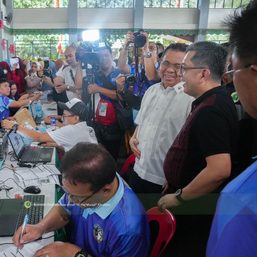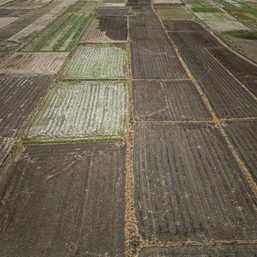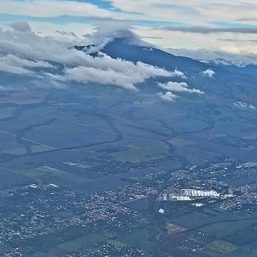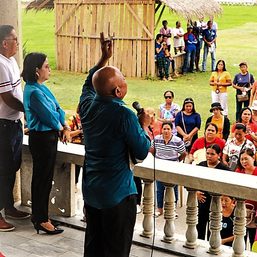SUMMARY
This is AI generated summarization, which may have errors. For context, always refer to the full article.

GENERAL SANTOS, Philippines – The prolonged dry spell is also wreaking havoc in Mindanao’s Soccsksargen region, with Cotabato province alone seeing more than P300 million in agricultural losses due to the rising temperatures and dry weather conditions.
Ruel Villanueva, administrative officer of Cotabato’s Office of the Provincial Agriculturist (OPAG), said on Thursday, April 18, that six local governments in the province reported a combined P306 million in damage to agricultural crops.
The worst-hit areas are the hilly towns of Arakan, Alamada, Aleosan, Magpet, Pigcawayan, and Kidapawan City.
The town council of Arakan, Cotabato, declared the municipality under a state of calamity on Monday, April 15. Aleosan was placed under a calamity state on April 8, while the same declaration for Alamada was made on April 1.
These declarations will allow the local governments to use their reserve funds for emergencies to provide aid to affected families and for other mitigation measures.
Price freeze
The Arakan town council passed a measure, initiating a price freeze on basic commodities and imposing stiff fines of up to P1 million and a 10-year jail term against violators.
During a Thursday meeting with the Provincial Disaster Risk Reduction and Management Council (PDRRMC), Cotabato Governor Emmylou Mendoza ordered the provincial agriculturist’s office to collaborate with the Philippine Crop Insurance Corporation (PCIC) to provide more aid to farmers suffering from the dry spell.
While Cotabato officials are still contemplating putting the province under a state of calamity, their counterparts from another area in the Soccsksargen region, Sultan Kudarat, issued the declaration on April 15.
Sultan Kudarat was declared under a state of calamity weeks after two of its towns – President Quirino and Lutayan – had their own separate declarations. President Quirino was the earliest to be declared under a calamity state on March 27, while the Lutayan declaration was made on April 3.
Widespread damage
The Sultan Kudarat provincial board declared the entire province to be in a state of calamity, citing the intense heat affecting crop productivity, food security, and scarce water supply as reasons for the declaration.
The legislature passed Resolution No. 136-2024, citing the assessment made by the Provincial Disaster Risk Reduction and Management Office (PDRRMO) on the continuing weather condition that has already caused widespread damage to crops and livelihoods, affecting all residents of Sultan Kudarat.
The effects of the El Niño phenomenon are also being felt in other parts of the Soccsksargen region such as Surallah, in South Cotabato, where local officials declared the town under a state of calamity, also on April 15.
South Cotabato Governor Reynaldo Tamayo Jr. said the provincial government has been preparing for a worst-case scenario to cushion the effects of a calamity on the province’s agriculture.
Drying up
Officials said irrigation dams in South Cotabato have been drying up due to the intense heat exacerbated by the lack of rainfall in the past weeks.
There has also been a noted receding of the water level of the Allah River that traverses the towns of Tboli, Surallah, Santo Niño, and Norala in South Cotabato, as well as Isulan and Esperanza in Sultan Kudarat. The Allah River is one of those that drains into the Ligawasan Marsh.
The Municipal Disaster Risk Reduction and Management Council (MDRRMC) in Surallah town, South Cotabato, reported losses to crops, fisheries, and livestock amounting to at least P71.8 million.
The Municipal Agriculture Office in Surallah listed 1,178 farmers and over 900 hectares of farmlands that sustained El Nino damages.
Surallah Mayor Pedro Matinong Jr. said nine villages in his town had earlier declared a state of calamity after farmlands sustained damages from the effects of intense heat and reduced rainfall.
In Alabel town, Sarangani province, municipal agriculturist Giselle Gestupa said more than 500 hectares of farms have dried up in the eight villages.
Alabel alone, officials said, suffered more than P40 million in agricultural damage.
Eight of Alabel’s barangays – Datal Anggas, New Canaan, Pag-asa, Paraiso, Spring, Tokawal, Dumulok, and Alegria – have been placed under the state of calamity.
No DA data
Regionwide, agriculture officials have yet to provide exact figures and data about the extent of the damage.
The Department of Agriculture (DA) in the Soccsksargen region said they were still waiting for the damage reports from the town and provincial governments.
“There are no El Niño reports from LGUs in the Soccsksargen region,” read an article on the website of DA-Soccsksargen.
John Pascual, DA-Soccsksargen executive director, said the department was prepared to support the local governments in the region needing assistance.
“We are currently revitalizing, repairing, and rehabilitating irrigation systems in the region,” he said. – Rappler.com
Add a comment
How does this make you feel?






















There are no comments yet. Add your comment to start the conversation.